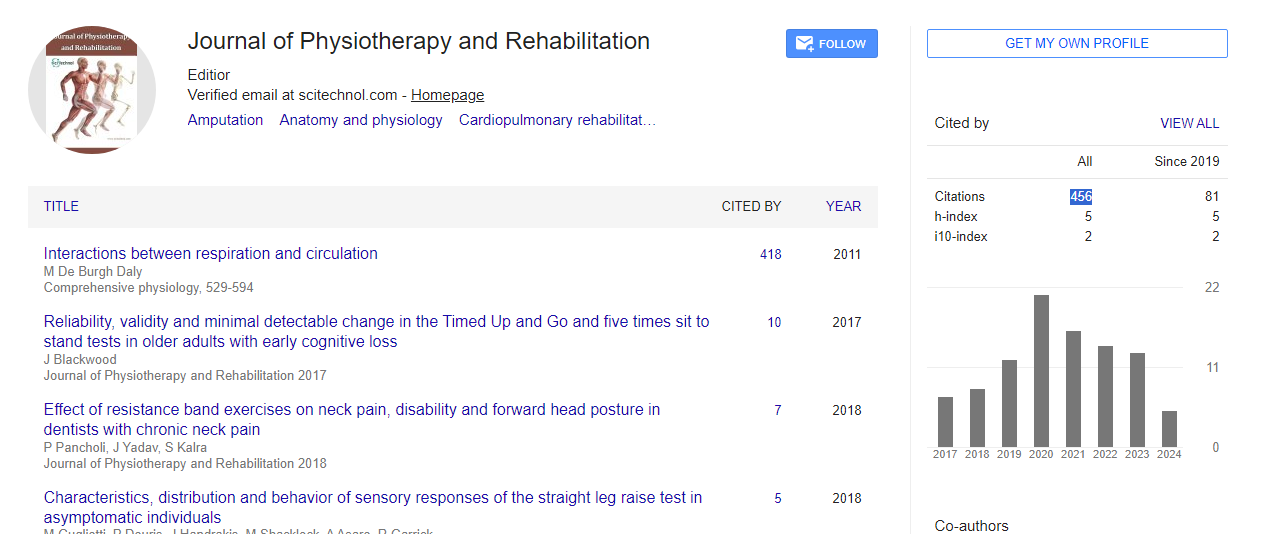Perspective, J Physiother Rehabi Vol: 7 Issue: 2
Speech Therapy to Treat Speech Disorders
Diano Neva*
Department of Physical Therapy, University of Miami, Coral Gables, Florida, United States of America
*Corresponding Author: Diano Neva
Department of Physical Therapy, University of Miami, Coral Gables, Florida, United States of America
E-mail: dianneva@gmail.com
Received date: 22 March, 2023, Manuscript No. JPTR-23-99192;
Editor assigned date: 24 March, 2023, Pre QC. JPTR-23-99192 (PQ);
Reviewed date: 15 April, 2023, QC No. JPTR-23-99192;
Revised date: 22 April, 2023, Manuscript No. JPTR-23-99192 (R);
Published date: 28 April, 2023, DOI: 10.4172/JPTR.1000130
Citation: Neva D (2023) Speech Therapy to Treat Speech Disorders. J Physiother Rehabi 7:2.
Description
Speech therapy is an essential treatment option for individuals who have speech disorders. Speech disorders are communication problems that involve difficulty in producing sounds or problems in using language. Speech therapy is an effective intervention that can help children and adults to overcome these communication problems.
Benefits of speech therapy
Speech therapy can provide a range of benefits for individuals who have speech disorders. Some of the benefits of speech therapy include:
Improved communication skills: Speech therapy can help individuals to communicate more effectively. Speech therapists work with individuals to develop strategies that can help them to improve their speech and language skills.
Increased self-esteem: Individuals who have speech disorders may struggle with self-esteem issues. Speech therapy can help individuals to improve their communication skills and increase their confidence.
Improved academic performance: Children who have speech disorders may struggle in school. Speech therapy can help children to improve their language skills, which can lead to improved academic performance.
Enhanced social skills: Individuals who have speech disorders may have difficulty in social situations. Speech therapy can help individuals to improve their communication skills, which can lead to better social interactions.
Process of speech therapy
The process of speech therapy typically involves an initial evaluation followed by individualized treatment sessions. The evaluation is conducted by a speech therapist, which will assess the individual's speech and language skills. Based on the evaluation, the speech therapist will develop a treatment plan that is tailored to the individual's needs.
Speech therapy sessions typically involve a range of activities designed to improve speech and language skills. These activities may include:
Articulation exercises: Articulation exercises involve practicing specific sounds or words to improve speech clarity.
Language activities: Language activities may include reading comprehension exercises, vocabulary development, and grammar exercises.
Oral motor exercises: Oral motor exercises involve practicing movements of the tongue, lips, and jaw to improve speech clarity.
Fluency exercises: Fluency exercises are designed to help individuals who stutter to speak more fluently.
Speech therapists may also incorporate technology into their treatment sessions. For example, some speech therapists use computer programs or apps to help individuals practice speech and language skills.
Helping individuals with speech disorders
Speech therapy can be an effective treatment option for individuals with speech disorders. Some of the ways in which speech therapy can help individuals with speech disorders include
Improving speech clarity: Speech therapy can help individuals to produce sounds more accurately, which can improve their speech clarity.
Enhancing language skills: Speech therapy can help individuals to improve their understanding and use of language.
Improving social interactions: Speech therapy can help individuals to communicate more effectively, which can improve their social interactions.
Increasing self-esteem: Improved communication skills can lead to increased self-esteem and confidence.
Conclusion
Speech therapy is a valuable treatment option for individuals with speech disorders. It can help individuals to improve their communication skills, enhance their social interactions, and increase their self-esteem. The process of speech therapy typically involves an initial evaluation followed by individualized treatment sessions that are tailored to the individual's needs. With the help of a speech therapist, individuals with speech disorders can overcome their communication challenges and improve their quality of life.
 Spanish
Spanish  Chinese
Chinese  Russian
Russian  German
German  French
French  Japanese
Japanese  Portuguese
Portuguese  Hindi
Hindi 